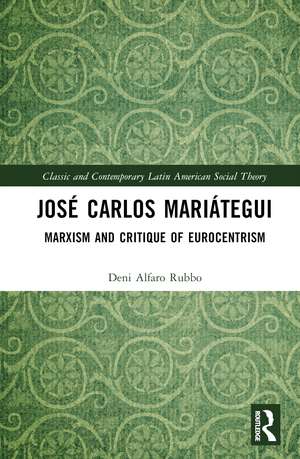José Carlos Mariátegui: Marxism and Critique of Eurocentrism: Classic and Contemporary Latin American Social Theory
Autor Deni Alfaro Rubboen Limba Engleză Hardback – 30 sep 2024
This posthumous fame is based on the idea that, in the whole of his political-theoretical project, the relationship between Latin America and Marxism was not built using a mechanical linking of effects and causes, of the blatant copy of the theory produced in Europe, of the immediate application of positivist formulas. In this complex relationship, enigmatic and insinuating, a dissonant historical temporality emerged in Latin America. The apparently unbalanced temporalities marked the matrix of capitalist exploitation, but also present, in Mariátegui’s view, glimmers of future possibilities.
This book is essential reading for scholars of social sciences and history interested in understanding the historical roots and political dilemmas of Latin American and European societies from the unique perspective of one of the greatest thinkers of the twentieth century.
Preț: 1003.75 lei
Preț vechi: 1224.08 lei
-18% Nou
Puncte Express: 1506
Preț estimativ în valută:
192.06€ • 200.53$ • 158.96£
192.06€ • 200.53$ • 158.96£
Carte tipărită la comandă
Livrare economică 04-18 aprilie
Preluare comenzi: 021 569.72.76
Specificații
ISBN-13: 9781032611594
ISBN-10: 1032611596
Pagini: 214
Dimensiuni: 156 x 234 mm
Greutate: 0.55 kg
Ediția:1
Editura: Taylor & Francis
Colecția Routledge
Seria Classic and Contemporary Latin American Social Theory
Locul publicării:Oxford, United Kingdom
ISBN-10: 1032611596
Pagini: 214
Dimensiuni: 156 x 234 mm
Greutate: 0.55 kg
Ediția:1
Editura: Taylor & Francis
Colecția Routledge
Seria Classic and Contemporary Latin American Social Theory
Locul publicării:Oxford, United Kingdom
Public țintă
Postgraduate and Undergraduate AdvancedCuprins
Introduction: Mariátegui: Contemporary Classic of the Critique of Eurocentrism Part 1: Sociocultural Expansion in Peru and the Formation of the Young Mariátegui 1. Mesocracy and Conditioners of Sociocultural Activities in Peru 2. “Nineteenth-Century Mandarins” and “Committed Centennialists” 3. Literary Bohemians of 1910 and Rebellion in Juan Croniqueur 4. Transition to “Big Politics” and Socialist Orientation Part 2: Europe as Rediscovery of the World Itself: Global Thought and the International Struggle 5. Europe in a Trance: International Circulation and Cosmopolitan Utopias 6. Crisis of Western Civilization, Crisis of Capitalism and Crisis of Progress 7. Marxism and Contemporary Thought: Unrepentant Dialogues Part 3: Criticism of Political and Epistemological Eurocentism: Translation of Marxism as a Peripheral Social Theory 8. Restless Preparations: Ideological Battle and Cultural Organization 9. Decipher Me or I Will Devour You: Translation of Marxism and the Peruvian Enigma 10. “You are Full of Europeanism”: The Socialist Revolution Against APRA 11. “Populist Nationalist”? The Communist International Against Indo-American Socialism. Conclusion: Mariátegui's Secret: Marxism and the Criticism of Eurocentrism
Recenzii
"Deni Rubbo's fine book is a concise and illuminating study of the critique of Eurocentrism in the life and work of the Peruvian José Carlos Mariátegui, one of Latin America's most important Marxist intellectuals in the twentieth century. His sociological approach to intellectual history - studying intellectual formation and influences, employment history, diverse life experiences and a wide range of both "minor" and "major" texts and correspondence - offers a fresh approach to understanding the intense process of Mariátegui's adoption and development of Marxism and his critique of Eurocentrism. The book is organized chronologically, deftly highlighting the main events, debates and formation of the Peruvian Marxist in relation to the critique of Eurocentrism. Rubbo's study joins an increasingly rich bibliography of Mariateguian studies that promise to enlarge our knowledge of key questions not only in the history of social theory and the left, but in current debates around strategy and tactics in social and workers' movements."
Sean Purdy, University of São Paulo
"The central axis of this book breaks with two contrasting images of Mariátegui: the nationalist and the cosmopolitan, which allows him to conclude, with great success, on the current possibilities of a non-Eurocentric Marxism. It is the result of several years of research in Brazil and Peru. He stands out for his extensive knowledge of sources and handling of Mariátegui's bibliography, which allows him to delve into the life and work of Mariátegui with a depth that has not been seen for a long time."
Ricardo Portocarrero Grados, former director of the Museum José Carlos Mariátegui and co-director of Archivo José Carlos Mariátegui
Sean Purdy, University of São Paulo
"The central axis of this book breaks with two contrasting images of Mariátegui: the nationalist and the cosmopolitan, which allows him to conclude, with great success, on the current possibilities of a non-Eurocentric Marxism. It is the result of several years of research in Brazil and Peru. He stands out for his extensive knowledge of sources and handling of Mariátegui's bibliography, which allows him to delve into the life and work of Mariátegui with a depth that has not been seen for a long time."
Ricardo Portocarrero Grados, former director of the Museum José Carlos Mariátegui and co-director of Archivo José Carlos Mariátegui
Notă biografică
Deni Alfaro Rubbo is Professor of Sociology at the State University of Mato Grosso do Sul (UEMS) and at the Graduate Program in Sociology at the Federal University of Grande Dourados (UFGD), Brazil. Ph.D. from the Graduate Program in Sociology at the University of São Paulo (USP). He works in the field of Sociology, with an emphasis on the sociology of intellectuals and culture, history and Brazilian and Latin American political-social thought. His other books include Párias da terra: o MST e a mundialização da luta camponesa (2016), O labirinto periférico: aventuras de Mariátegui na América Latina (2021).
Descriere
This volume explores the life, work, and impact of the Peruvian thinker José Carlos Mariátegui (1894-1930), particularly his political biography, his intellectual production, and his critique of Eurocentrism.






